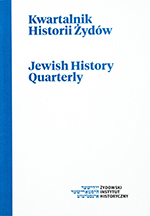Anan ben Dawid jako islamizujący heretyk żydowski: o tym, jak raw Saadia Gaon stworzył mit fundacyjny karaizmu
Anan ben David as Islam-leaning Jewish Heretic: how Rav Saadia Gaon Laid Down the Founding Myth of Karaism
Author(s): Marzena ZawanowskaSubject(s): History of Judaism, History of Antisemitism
Published by: Żydowski Instytut Historyczny
Keywords: Anan ben David; Rav Saadia Gaon; Karaites/Karaism; Ananites/Annanism; medieval Judaism; religious polemics
Summary/Abstract: The paper explores the recently reconstructed and edited polemical work Kitab al-radd ʻala ʻAnan [The Book of Refutation against Anan] written in the early 10th c. CE by the allegedly “archfoe” of the Karaites, rav Saadia Gaon (d. 942). It focuses on the reconstruction of the story of Anan ben David (VIII c.), who with time begun to be considered the founding father of Karaism, and demonstrates that it was Saadia who created the basic myth of his lifestory. This myth was later on used not only by other rabbanite polemicists, but also appropriated by the Karaites. It includes several important elements, unknown from earlier sources, which constitute Saadia’s genuine contribution to the conceptualization of Karaism, its origins and nature. They are 1. Pinpointing Anan as the source of religious schism in medieval Judaism; 2. Historicization of Anan’s figure thanks to providing short description of his biography and psychological depiction of his character, including motives of his behavior; 3. Socio-political contextualization of his life and deeds; 4. Historical reconstruction of the development of heresy in Judaism, including the indication of common treats between the ancient sectarians (Sadducees) and Anan’s followers (Karaites); 5. Cultural rooting of Anan’s doctrine in its Islamic environment. All these elements have permanently entered the discourse on Karaism in Rabbanite and Karaite writings like. In addition, lack of other historical sources and/or symbols, the story created by Saadia was later on appropriated by the X-XI c. Karaites (i.e., Elijahu ben Abraham, Chiluq ha-Qaraim ve-ha-Rabbanim), who at the time desperately needed unifying myths, as the founding myth of their religion. It is therefore possible to conjecture that if not for the Babylonian geonim, who sought for the unification of Judaism and centralization of religious and political power in their own hands, and for polemical purposes first elevated Anan to the rank of a symbol (Rav Natronai Gaon) and then reconstructed his lifestory (Rav Saadia Gaon), it is not unlikely that he would not have been recognized by the Karaites as the founding father of their movement.
Journal: Kwartalnik Historii Żydów
- Issue Year: 265/2018
- Issue No: 01
- Page Range: 9-34
- Page Count: 26
- Language: Polish
- Content File-PDF

